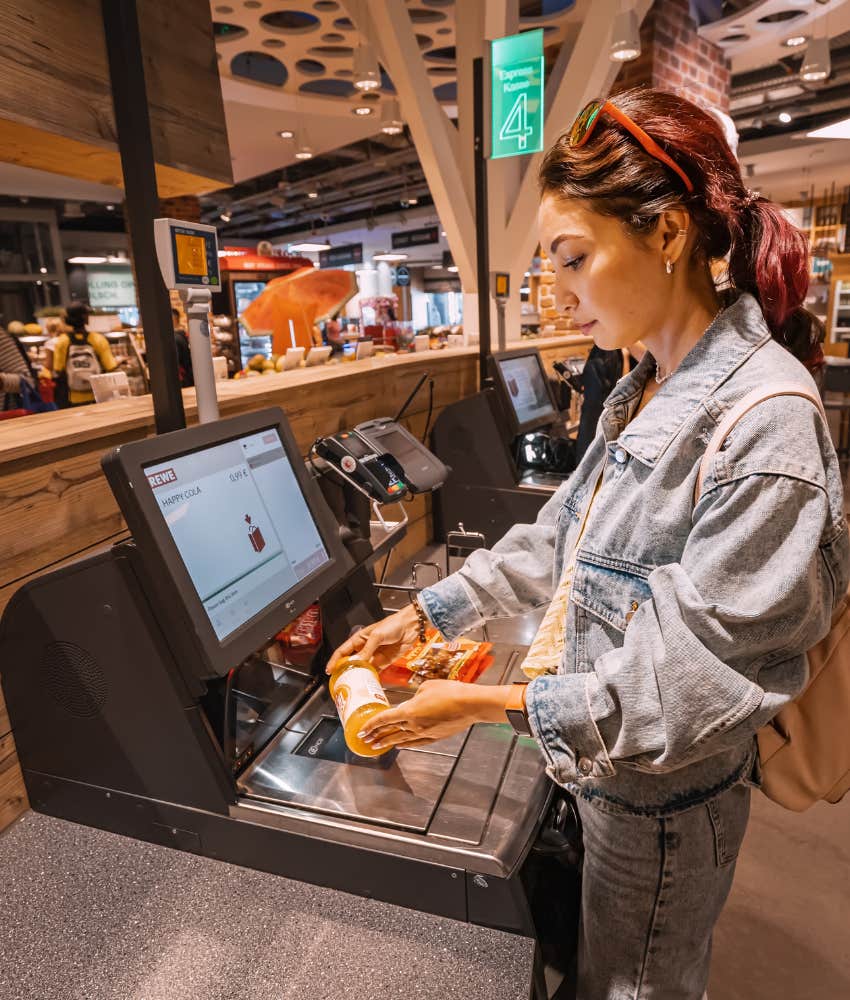People Convinced In-Person Shopping Will Soon Be Obsolete After Video Shows All Of The Products Now Locked Up In Stores — ‘It’s All By Design’
Is retail changing because of crime and shoplifting? Or because retailers want to close up shop for good?
 PeopleImages.com - Yuri A | Shutterstock
PeopleImages.com - Yuri A | Shutterstock There's no doubt about it, shopping has changed dramatically since the pandemic, and as time passes, it only seems to be changing faster.
From ever-rising prices to inventory problems and stores closing left and right — and more of those dang self-checkout machines — retail is definitely transforming, and retailers themselves say it's primarily to do with one factor: skyrocketing theft.
But not everyone is convinced, including those who actually track the data on such things. And it's got skeptics suspecting something else is at play.
People are convinced retailers are trying to end in-person shopping with moves like locking up all merchandise.
Recently, a video went viral on TikTok after giving many people a dystopian vibe. Filmed in what appears to be a grocery store, the video shows all the merchandise firmly locked away in glass cases.
And not just the usual suspects like electronics or things like baby formula that are commonly stolen out of desperation. In this store, EVERYTHING is under lock and key, from cereal to candy to granola bars.
The shocking video led to many similarly shocked responses, many blaming "Democrat cities" supposedly full of crime (a dubious claim at best — red states have had higher murder rates, for example, for more than 20 years).
Others cited the supposedly staggering rates of shoplifting we constantly hear about in the news, which retailers say are forcing not just the locking up of merchandise but widespread store closures and bankruptcies.
But others felt the video pointed at something deeper and more conspiratorial than mere crime.
"It’s all by design," one person wrote. "They don’t want you in stores anymore. Curbside/delivery only. It’s a lot cheaper to run one warehouse vs. five storefronts. And only employee theft to deal with." That may sound like tinfoil hat territory, but it turns out it's a far more plausible explanation.
Though it's a popular right-wing media talking point, there is no actual evidence that shoplifting is on the rise.
To hear retailers and right-wing media tell it, the American retail industry is absolutely beset on all sides 24 hours a day by marauding bands of shoplifters — literally, with retailers claiming armed gangs are constantly targeting their stores, a claim that persists despite having been recanted by those who made it.
There are a couple of problems with this narrative — notably that there is no data backing it up. Situations vary from city to city or even neighborhood to neighborhood, of course. Some surely have seen spikes in shoplifting in recent years, and black markets have also arisen due to supply chain issues and skyrocketing inflation.
But overall, not only is crime in general declining across the US, but shoplifting specifically has declined as well. The Council on Criminal Justice found that average annual shoplifting actually decreased by more than 10% in 24 of the nation's largest cities between 2019 and 2023 — the very period, of course, when retailers claim their stores have been besieged by shoplifters.
The retail industry's own data doesn't back these claims up, either. First, a vocabulary lesson: Retailers use the term "shrink" to refer to the difference between their actual inventory and the inventory they're supposed to have according to accounting records.
Retailers use the words "shrink" and "theft" interchangeably in the media, especially in recent years when they've blamed theft for declining profits. But it's a total misnomer — theft is only one of several factors that result in the discrepancies known as "shrink."
And to that point, tracking by the National Retail Federation showed that shoplifting only accounted for 36% of shrink industry-wide in 2022, the year retailers began crowing about a crime wave.
Analysts say retailers are instead covering up their own mismanagement by blaming shoplifting.
So if the "crime wave" isn't real and shoplifting is down, why are retailers seeing so much "shrink" that they're turning to draconian measures like locking up all merchandise and closing stores because of it?
Findings by retail industry analysts like research firm William Blair suggest that it's actually a gambit to not spook investors and shareholders by scapegoating shoplifting in order to distract from the combination of retailers' own management mistakes and softer demand for goods overall (in part due to exorbitant prices) that are cutting into corporate profits.
Remember that 2022 National Retail Federation report mentioned above? In addition to the 36% of shrink from shoplifting, they found another 29% came from employee theft and 27% from "process, control failures and errors."
In other words, the retailers' own mismanagement of their staff, security, and inventory processes, including misestimating demand following the pandemic, is, at least in part, to blame.
There is indeed evidence that retailers may be trying to get rid of, or at least decrease, in-person shopping.
It seems like that TikTok commenter's conspiratorial instincts just might be the endgame of all this drama. Target is perhaps the best example.
The company has closed scores of stores nationwide, citing the supposed theft problems. But after closing one Manhattan store in Harlem supposedly due to shoplifting, it opened a new store only a mile-and-a-half away, but in a much smaller space.
The former store's landlord, speaking to Bloomberg, said this was part of an overall “business decision" on Target's part to shrink its business down "to small-format stores." Notably, he said that crime or shoplifting never came up during talks about terminating Target's lease.
Target has somewhat infamously begun slashing its staff numbers, too, resulting in notoriously long checkout lines. If you've been to Target recently, it's easy to get the impression the company is trying to make shopping in-store as miserable as possible so people will simply stop doing it.
Some also believe this is why retailers keep investing in more self-checkout machines, despite the fact that they are notoriously unreliable, shoppers hate them, and — you guessed it — they result in far more "shrink" due in part to the ease of shoplifting but also because of the machines' constant mistakes.
 frantic00 | Shutterstock
frantic00 | Shutterstock
The bottom line is just like how so much of our retail inflation has turned out to just be retailers engaging in price gouging, it really seems like the retail industry is full of it here too, and that TikTok commenter's suspicions might just be spot-on.
Especially when taking into account one other major factor: a seeming political motivation, with retailers calling on Congress to "do something" about this supposed epidemic of shoplifting that… doesn't actually exist.
That the politicians willing to do so tend to be Republicans in the tank for corporations, and untrue horror stories about surging crime in "Democrat cities" are a constant right-wing news trope, may just all be a coincidence. But unlike retail shopping nowadays, it's an awfully convenient one.
John Sundholm is a news and entertainment writer who covers pop culture, social justice, and human interest topics.
